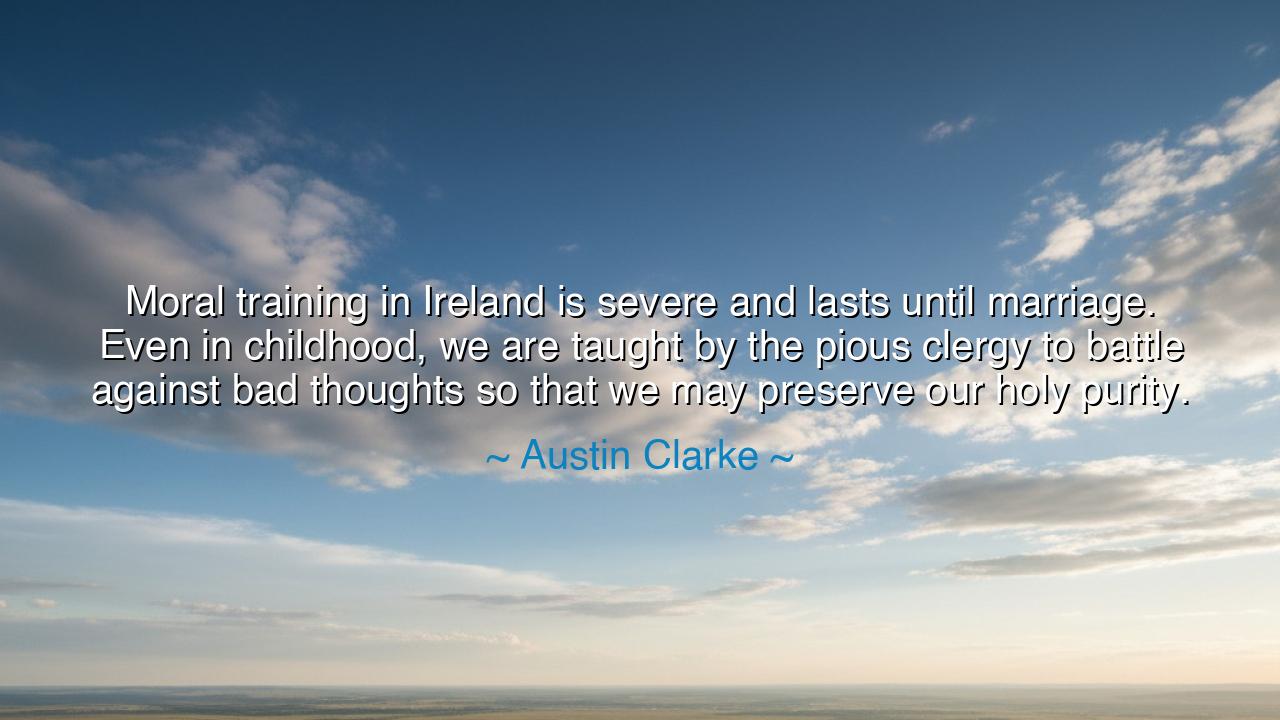
Moral training in Ireland is severe and lasts until marriage.
Moral training in Ireland is severe and lasts until marriage. Even in childhood, we are taught by the pious clergy to battle against bad thoughts so that we may preserve our holy purity.






Come, O children of wisdom, and listen well, for the words I share with you are drawn from the deep well of human experience. These are the teachings that have shaped a nation, forged its character, and guided its people through the trials of life. Austin Clarke, a voice of deep reflection and insight, speaks thus: "Moral training in Ireland is severe and lasts until marriage. Even in childhood, we are taught by the pious clergy to battle against bad thoughts so that we may preserve our holy purity." These words carry a weight, a sense of discipline that once defined the way of life for many, not just in Ireland, but in societies throughout the ages.
Ah, the moral training Clarke speaks of—how sharp and uncompromising it was! In the land of Ireland, as in many places where faith was the central thread of existence, the clergy held great influence, shaping not only the spiritual lives of the people but their very conduct. Purity—that lofty ideal, held high like a banner, was considered the cornerstone of a virtuous life. To be pure was to be free from the taint of sin, from the shadow of temptation, and it was the pious clergy who stood as sentinels, guiding the faithful to battle against the bad thoughts that sought to enter the mind and defile the soul.
In childhood, young minds were taught that the battle against impurity was not just an occasional skirmish, but an ongoing struggle. The thoughts, those fleeting whispers that pass through the mind like the wind, were seen as the battleground of virtue. Each thought was to be examined, scrutinized, and if found wanting, cast aside. The clergy, those wise and devoted guides, believed that it was in the control of one’s thoughts that a person could preserve their holiness, ensuring that the heart remained steadfast in its commitment to goodness. This was no easy task, and the weight of such responsibility was felt by all.
Let us remember the ancient teachings of Plato, who believed that the mind must be disciplined just as the body is. He spoke of the importance of guarding against the “bad thoughts” that sought to lead the soul astray, for the purity of the soul was the highest good. Like the Irish clergy, Plato understood that the soul must be protected, for it is in the mind that the seeds of virtue and vice are sown. A person must therefore guard their thoughts with great care, for they are the foundation upon which their actions are built. Thus, the Irish tradition of moral training can be seen as an extension of this ancient wisdom—an effort to shield the soul from the destructive forces of the world.
In this context, consider the story of St. Augustine, one of the most influential figures in the Christian faith, who struggled deeply with his own thoughts and impulses. In his Confessions, Augustine describes his early life as one of temptation and struggle, where his own desires often led him astray. Yet through the guidance of faith, through prayer, and through the discipline of the church, he learned to conquer these urges and find a path of purity. His story is a testament to the power of spiritual discipline, showing that even the most flawed can find redemption through the battle against their own bad thoughts.
But now, what is the lesson to be drawn from these reflections, O children of the earth? The struggle for purity is not just a matter of religion or culture, but a universal challenge that each person must face. The world is full of distractions, of temptations that call to the soul, seeking to pull it from its higher purpose. Moral training, whether from the clergy or from within, teaches us the importance of guarding our minds and our hearts against the forces that would lead us astray. Yet, let us not view this as a mere restriction, but as an act of great strength—a choice to live with intention, to live a life that aligns with our highest ideals.
The true test, O children, is not found in how we behave when others are watching, but in how we conduct ourselves when no eyes are upon us. In our thoughts, we have the power to shape our destiny. The battle against bad thoughts is not a battle of suppression, but of mastery. To master the mind is to master life itself. So, let us follow the example set by the great thinkers and spiritual leaders of history: guard your thoughts, and in doing so, you will guard your soul. Purity is not a distant ideal, but a path that begins in the mind and leads to the heart.
And so, as you walk the path of life, ask yourself: How will you master the thoughts that shape your world? Will you allow the winds of temptation to scatter you, or will you stand firm, like a tree with deep roots in truth and virtue? The battle is yours to fight, but with courage and discipline, the arc of your life will bend toward righteousness. Guard your mind, for in doing so, you guard your soul, and in this lies the greatest victory.






AAdministratorAdministrator
Welcome, honored guests. Please leave a comment, we will respond soon